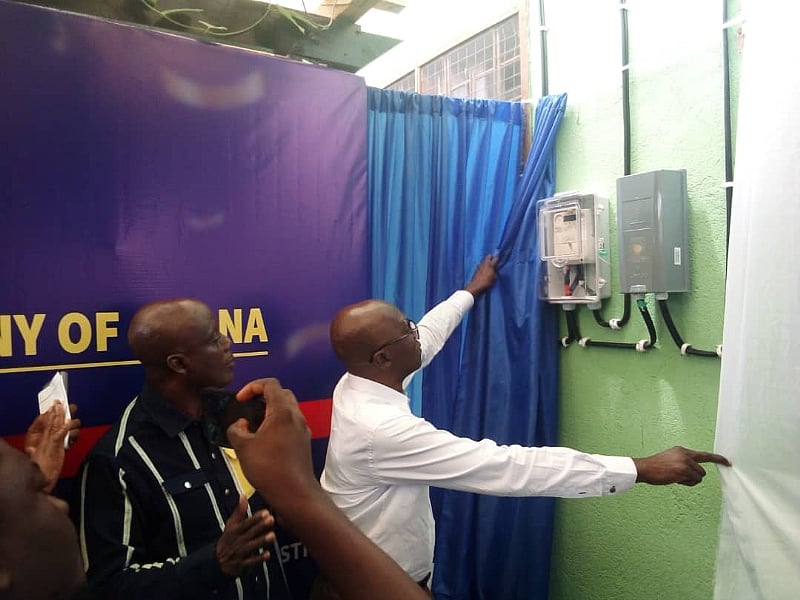The Electricity Company of Ghana (ECG) has embarked on a transformative journey to modernize its operations and improve service delivery through the Loss Reduction Project (LRP). Launched in the Ho District of the Volta Region, this initiative signifies a crucial step towards enhancing efficiency, curbing power theft, and ensuring the financial sustainability of the company. The core of the project lies in the installation of smart prepaid meters, a technological upgrade designed to accurately measure electricity consumption and facilitate transparent billing. This move is expected to significantly reduce system losses, which have long plagued the ECG, and bolster revenue generation through precise billing practices. The launch event, themed “Delivering Value to Customers Through Smart Prepaid Metering for Greater Efficiency,” brought together key stakeholders, including ECG officials, technology partners, and community representatives, to underscore the importance of this modernization effort.
The introduction of smart prepaid meters marks a paradigm shift in electricity consumption and payment within Ghana. Mrs. Adwoa Hudson-Butler, CEO of WINA Technologies, the company partnering with ECG on this project, emphasized the need for a cultural change in how Ghanaians perceive and pay for electricity. Highlighting the essential nature of electricity as a paid service, akin to purchasing fuel, she stressed that the escalating demand for power necessitates a move away from outdated systems and practices that contribute to losses, including power theft. The smart meters, assembled locally in partnership with international technology companies Conlog of South Africa and Iskraemeco of Egypt, are equipped with robust anti-tampering and anti-theft mechanisms, ensuring the integrity of the metering system. This technological advancement signifies a crucial step in safeguarding ECG’s resources and promoting responsible electricity consumption.
Addressing public concerns regarding potential bill increases with the new meters, Mr. Bernard Pi-Bansah, Project Manager for the LRP, clarified that the improved accuracy of the smart meters is the key factor. He explained that many existing meters, some over 15 years old, often under-record actual consumption due to age-related deterioration. Therefore, the new meters, while not inherently “faster,” provide a more precise measurement of electricity usage, ensuring customers pay for what they consume. Mr. Pi-Bansah emphasized the compliance of these meters with Ghana Standards Authority regulations and international specifications, assuring the public of their reliability and accuracy. He further appealed for public and media support in educating the community about the project’s benefits, emphasizing that transparent billing is essential for ECG’s long-term viability.
Ms. Christina Jatoe-Kaloe, Volta Regional General Manager of ECG, underscored the importance of honesty and accountability in the successful implementation of the LRP. Characterizing the project as an initiative for the collective good, she called for unwavering integrity from both ECG staff and the public, urging everyone to “walk straight.” This emphasis on ethical conduct reflects ECG’s commitment to transparency and fairness in its operations. Ms. Jatoe-Kaloe warned that a lack of regional ownership and commitment to the project could lead to its reassignment, emphasizing the importance of “Team Volta” taking responsibility for its success. She expressed confidence in the team’s ability to embrace both the technological and mindset shifts required for this transformative initiative. Ms. Jatoe-Kaloe also stressed the importance of all ECG staff, regardless of their department, understanding the functionality of the smart meters and the associated tariffs, reinforcing the idea that every staff member serves as an ambassador for the company.
The rollout of the smart meters in the Ho District will be implemented in phases. Mr. Richard Mac Ekor, Ho District Manager of ECG, outlined the prioritization plan for the first phase, which includes customers who are already paid up within Ho township, those previously on flat rate billing, and customers requiring replacements for faulty prepaid meters. This strategic approach ensures a smooth transition and prioritizes those most in need of updated metering systems. Subsequent phases will extend the project’s reach to cover the entire Volta Region. The overarching goals of the LRP encompass improved billing accuracy, enhanced customer satisfaction, increased revenue collection, and the promotion of energy conservation. The inauguration of the District Sub-Project and Regional Management Committees further solidifies the commitment to effective oversight and successful implementation of the project.
The LRP signifies more than just a technological upgrade; it represents a fundamental shift towards rebuilding trust, ensuring fairness, and securing Ghana’s energy future. The stakeholders at the launch event emphasized that the project is about fostering transparency and accountability in electricity consumption and payment. By addressing the issue of system losses and ensuring accurate billing, the ECG aims to strengthen its financial position and invest in further infrastructure development. The LRP, therefore, is a crucial step towards a more sustainable and reliable energy sector in Ghana. It promises to not only improve the efficiency of electricity distribution but also to empower consumers with greater control over their energy usage, fostering a culture of responsible consumption and contributing to the overall development of the nation’s energy infrastructure.














